When Russell Teo was just 18 years old, his mother suffered a stroke.
Their lives were turned upside down — her illness was terminal and she was in a coma. Accompanying his mother by her bedside, he observed how nurses at the hospital administered her treatment with the utmost care and was touched by how they spoke to her as they would any other patient despite her prognosis.
Russell was also struck by the heartfelt concern shown by the nurses to him and his father, ensuring that they both had enough rest and taking the time to explain how best to care for his mother.
Inspired by the tangible impact of the work that nurses do, Russell decided to pursue nursing at NUS’ Alice Lee Centre for Nursing Studies (NUS Nursing).
Now a recent graduate of NUS Nursing, Russell is eager to make a positive impact in the lives of his patients as he continues to grow as a healthcare professional.
Nursing in a nutshell
Back then, the young undergraduate saw how the NUS Nursing programme offered intellectually stimulating courses and a nurturing environment that not only cultivated compassionate nurses, but also shaped future healthcare leaders.
As Asia’s leading nursing programme, he was impressed with the school’s state-of-the-art simulation training facility, as well as its close partnerships with Singapore's top hospitals.
Before joining NUS Nursing, Russell expected the programme to focus on hands-on learning. However, he was pleasantly surprised to discover that nursing students were taught critical theoretical concepts across a wide range of disciplines, from medical topics such as pathology, anatomy and physiology, to humanities subjects like psychology and sociology. Training for soft skills like communication were also interwoven seamlessly throughout his lessons.
“NUS has moulded us into being versatile and well-rounded, which perfectly aligns with who I want to be as a nurse.”
Russell was also keen to discover that NUS Nursing offered a course on providing mental health care to help patients dealing with such illnesses in both institutional and community settings. Apart from picking up knowledge about the different types of mental health conditions, symptoms and treatment options, he learnt how best to approach such a sensitive topic with patients and their caregivers.
Russell recalls how NUS Nursing prepared him and his classmates for the field through simulations of the challenging and complex scenarios they may encounter in real life. “Not only was I able to learn more about potential cases through this simulation, I was given the opportunity to practise de-escalation techniques and effective communication in a safe space,” Russell reflects.
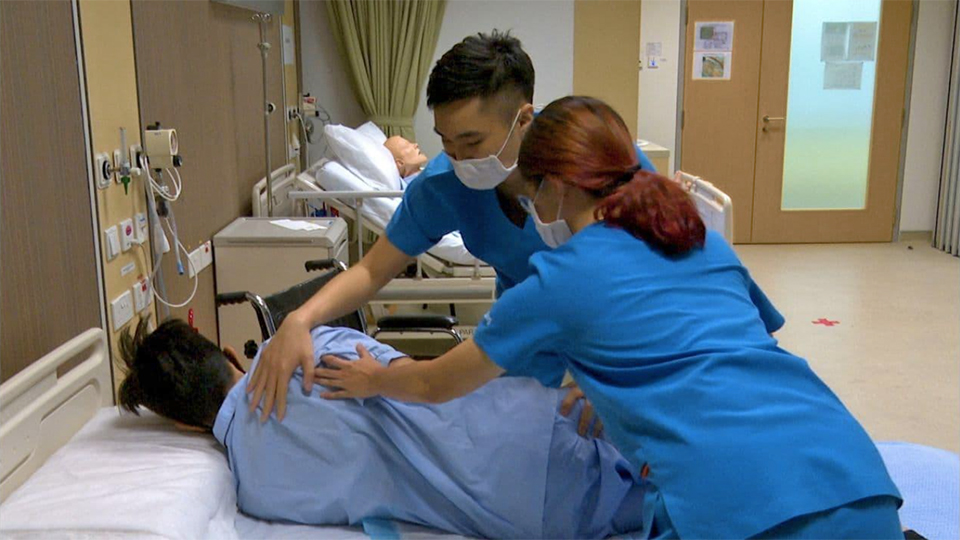 Russell (centre) practising his clinical skills with fellow NUS Nursing students in the Centre for Healthcare Simulation at NUS Yong Loo Lin School of Medicine.
Russell (centre) practising his clinical skills with fellow NUS Nursing students in the Centre for Healthcare Simulation at NUS Yong Loo Lin School of Medicine.
Learning from the ground up
To further empower the nurses of the future, the NUS Nursing curriculum includes frequent placements in partner hospitals that begin as early as the first six months of the programme. Students are exposed to various departments — from accident and emergency to gynaecology, with “the degree of complexity of the attachments gradually increasing every year,” Russell explains.
He shares how his Year 1 placement focused on basic care such as feeding patients and helping them with their routines. In Year 2, he began administering medications and helping to plan patients’ regimens. With more knowledge and experience under his belt by Year 3 and 4, Russell felt confident in navigating the field with less assistance from his supervisors and proactively liaising with other healthcare staff to provide competent care.
Although Russell’s cohort received restricted access to healthcare settings during the COVID-19 pandemic, he shares that the guidance he received during that period was still a priceless one that greatly shaped his education journey.
“Despite the limitations, our lecturers made it a point to hold regular virtual meetings and remote learning, so we could share and reflect on the valuable insights we had during our placements as a class.”
The help along the way
Russell recalls how his time with the NUS Nursing’s dynamic lecturers and their engaging lessons prepared him for his role today. He adds: “My lecturers were very patient and supportive, and kept the lines of communication open even after work hours.”
That was helpful because Russell was new to the world of biology and lacked the foundation that many of his peers already had when they first joined the nursing programme. As such, he wasn't familiar with the rudimentary biology concepts taught at Junior College and Polytechnic which his lecturers often referenced.
Determined to catch up, he persevered, and the combination of his grit and his lecturers’ guidance meant that he was eventually able to flourish.
“If you want to pursue a nursing degree without a biology background, go for it!” he advises. “Don’t let one subject hinder you from pursuing the whole course. It won’t be easy but it gets easier with time. By the second year, you’ll be up to speed with everybody else who had prior biology knowledge.”
Another NUS staff member who left an impression on him was his Student Support Manager Lim Fui Ping. When his mother fell terribly ill while he was in NUS, she offered support and a listening ear.
“I felt burnt out, and didn’t know what to do. But Ms Lim was so supportive and kept me grounded. She even made time to see me. Even today, she’ll drop me a text every now and then to check in on me. It is these small things that have kept me going.”
Just like the nurses who cared for Russell’s mother, Ms Lim went above and beyond to ensure her students’ welfare as a nursing educator.
Connecting to a community
Russell has a deep appreciation for the people who supported him through the toughest times in his life. Now, he wishes to repay their kindness by passing it on and hopes to inspire others to do the same.
During his second year in NUS, Russell volunteered to be a peer-tutor for the Pathophysiology, Pharmacology and Nursing Practice I course where he mentored his juniors, guiding them not only in their practical work, but also helping them refine their professional intuition.
Russell was also the House Captain and Head of Welfare for the Nursing Sub-Club, where he organised events such as workshops that helped students better prepare for their exams, house games to promote camaraderie, as well as fundraising events for charitable causes.
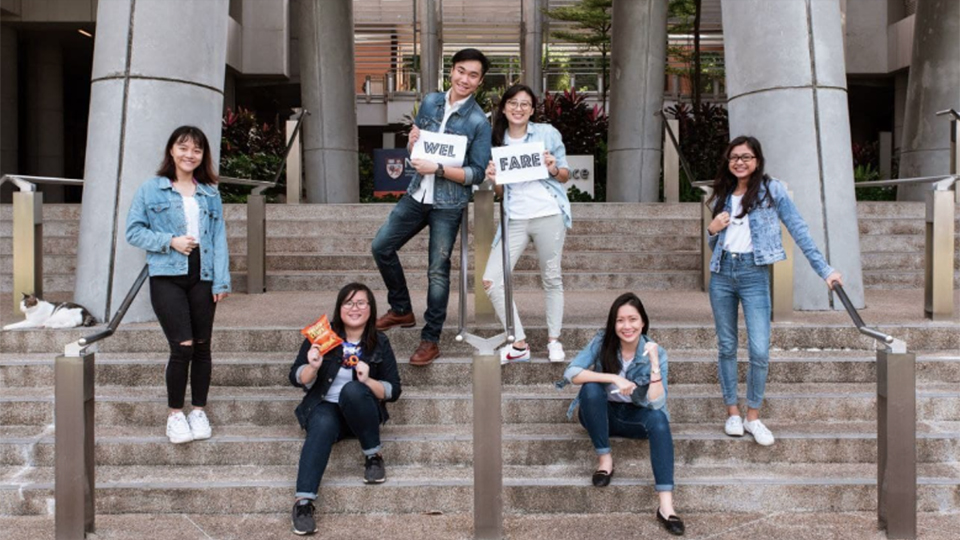 Russell (third from left) with the NUS Nursing Sub-Club’s Welfare Team at NUS University Town.
Russell (third from left) with the NUS Nursing Sub-Club’s Welfare Team at NUS University Town.
He even carved out time to participate in a medical mission to Indonesia. Under the guidance of the Youth Expedition Project (YEP) team and local healthcare volunteers, he managed a mobile clinic which visited various villages to provide basic health check-ups and medical care for the villagers.
“This journey gave us an immeasurable perspective of the privilege we have in Singapore and the many things we should be grateful for.”
Immensely moved by his experience and keen to return on more medical missions to Indonesia, Russell even chose to do a Minor in Bahasa Indonesia so that he could interact with and serve the locals better in future.
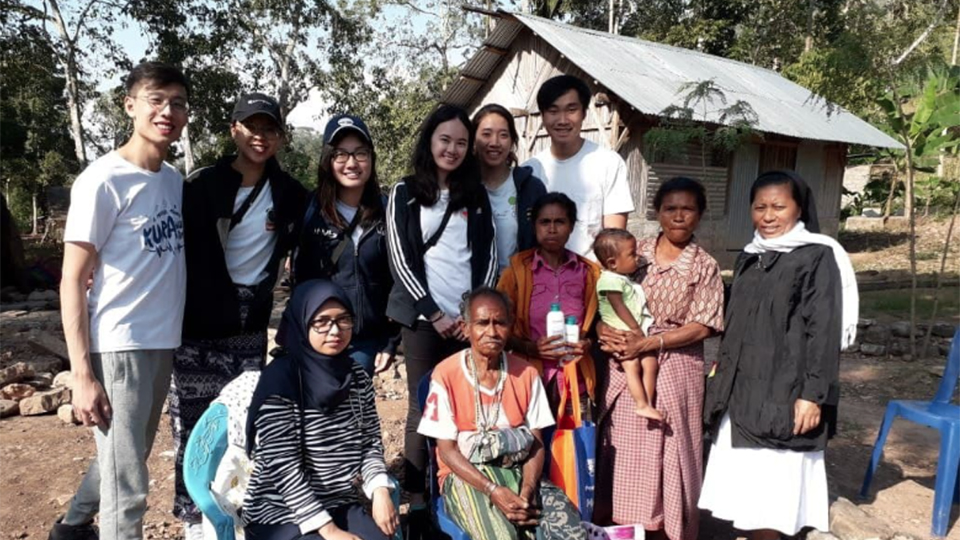 Russell (back row, first from right) with fellow NUS students on their medical mission trip to Indonesia.
Russell (back row, first from right) with fellow NUS students on their medical mission trip to Indonesia.
Combating compassion fatigue
Although Russell has many lofty goals, he is acutely aware that one could burn out, and face compassion fatigue. Indeed, this threat is a serious one in the medical field, as nurses frequently face emotional exhaustion.
To deal with this, Russell advocates for nurses to tap on NUS’ multitude of extracurricular activities as an outlet for support and relaxation.
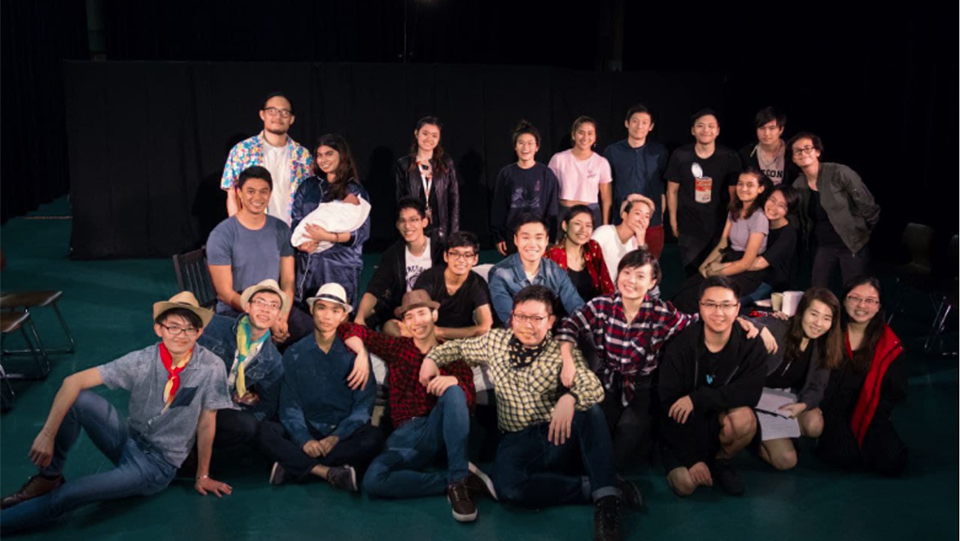 Russell (second row, fourth from left) with fellow actors and stagehands from NUS Stage.
Russell (second row, fourth from left) with fellow actors and stagehands from NUS Stage.
As a student, he spent much of his after-school hours at NUS Boxing, NUS Muay Thai and NUS Stage. Being able to focus on non-nursing activities helped him to explore new hobbies, and destress.
“In order to give the best care, you must be balanced — you cannot provide good care if you’re pushing yourself to a point where you get too stressed,” Russell advises.
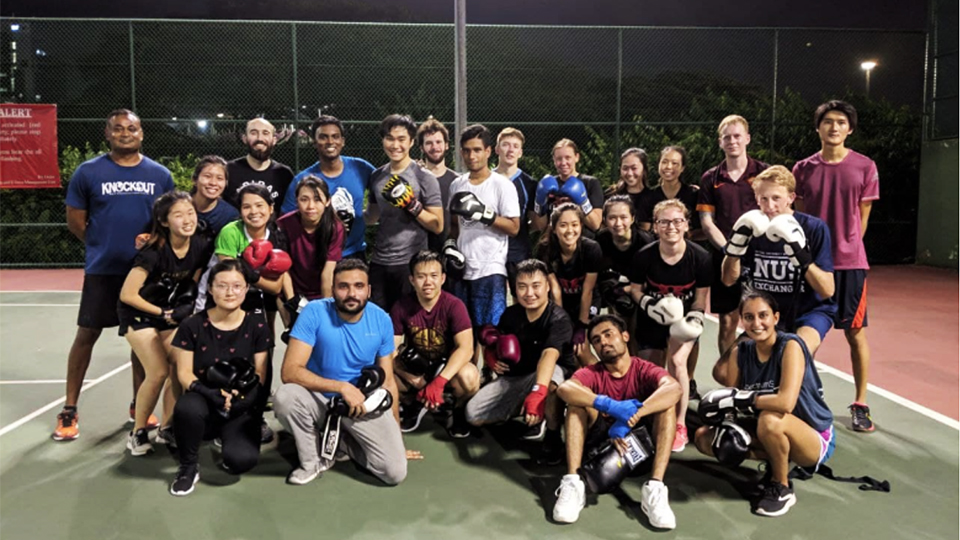 Russell (back row, fourth from left), with the NUS Boxing student interest group after an intense training session.
Russell (back row, fourth from left), with the NUS Boxing student interest group after an intense training session.
Touching lives
As a newly registered nurse at Singapore General Hospital, Russell hopes to utilise everything NUS Nursing taught him to make a positive impact on the lives of those he comes across. By doing so, he hopes to inspire more people to pursue a career in nursing and shape the future of patient care.
He shares a parting reflection: “Nurses care for their patients, not just medically but holistically. Nursing is one of the most professionally, personally and spiritually rewarding careers there is.”